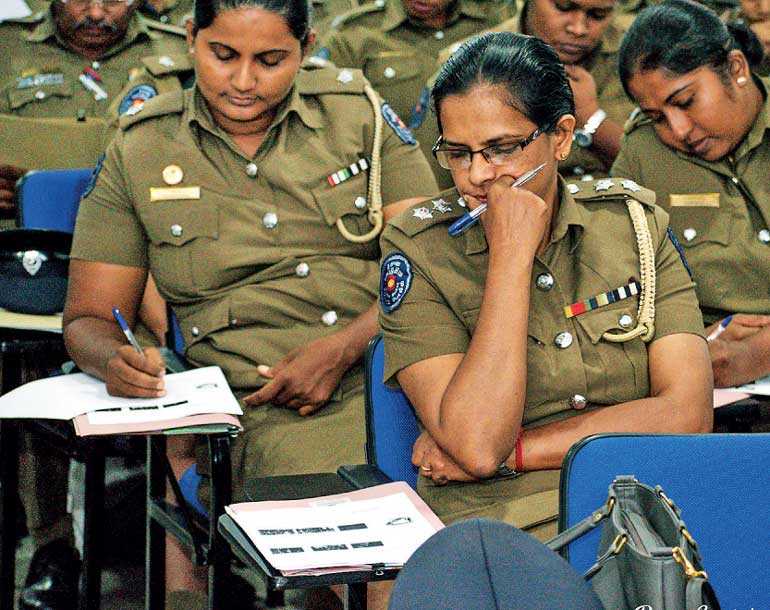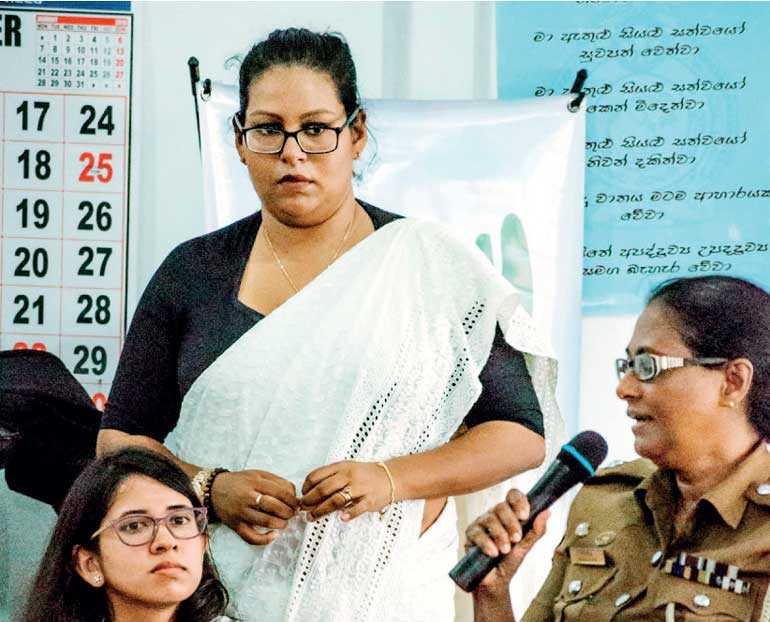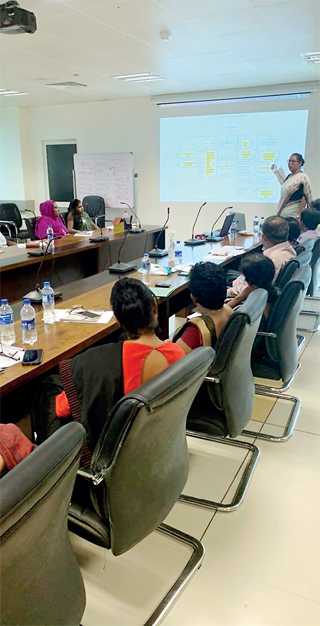Tuesday Feb 17, 2026
Tuesday Feb 17, 2026
Saturday, 10 October 2020 00:05 - - {{hitsCtrl.values.hits}}


By Shailendree Wickrama Adittiya
|
Founder Milani Salpitikorala
|
 |
The National Child Protection Authority (NCPA) of Sri Lanka received 8,558 complaints via its 1929 ChildLine in 2019 alone. Of these, 2,342 were incidents of cruelty to children, 1,290 were incidents of compulsory education, 906 were neglect of children, and 594 were incidents of sexual harassment.
The Sri Lanka Police recorded 80 cases of cruelty to children and 34 cases of exploitation of children the same year.
Looking at the above data, it is fair to say that Sri Lanka is far from being a country that is safe for children, making it necessary for society and law enforcement to take measures to protect children. The Child Protection Force is an organisation that offers legal assistance to children in a system that is far from being child-friendly.
The Child Protection Force (CPA) is a non-profit organisation that primarily acts as a legal service. The CPA also looks into the psycho-social aspect of the victim and their family.
The organisation’s Board of Directors includes Attorney-at-Law Milani Salpitikorala, marketer Mihiri Salpitikorala, former diplomat and civil servant with over 35 years of experience Daya Liyanage, Attorney-at-Law and Senior Counsel Harshana Nanayakkara, and Attorneys-at-Law Wasana Kannangara and Prathibha Gamage.
According to Founder Milani Salpitikorala, the CPA conducts workshops to empower the child, which the organisation has identified as the best method for prevention of crimes against children. Other workshops conducted by the CPA target Government and non-Government child sector workers like the Police Children and Women Bureau officers, probation officers, teachers, and parents.
These workshops range from empowering law enforcement officers with practices of mindfulness, motivation, and stress management to improving the emotional intelligence, body safety, cyber safety, and protective behaviours of children.
Founding the CPF
Going back to the beginning, Salpitikorala told Weekend FT that, during a difficult time in her career, she started working for former Supreme Court Justice Shiranee Tilakawardane, a child rights activist with immense knowledge on the topic. “She introduced me to many child rights activists, especially to the late Sajeewa Samaranayake, who turned out to be my guru and took the ‘angry activist’ side of me out and threw it away,” she said, explaining that Samaranayake taught her how to gain more knowledge on holistic approaches and a more child-centric justice system rather than taking an aggressive approach. “This is exactly how I started carrying his legend forward,” she added.
Justice Tilakawardane also introduced her to Harshana Nanayakkara, who continues to be her guru and motivates her every time she crashes emotionally after a traumatic case. Having found her passion in child rights, Salpitikorala worked alongside the NCPA on a project on identifying cases within courts and entering them into a system.
“We found that there were many cases that no longer needed to be dragged in the system but could have easily been settled and closed if proper legal assistance was given to them. This is when I started drafting a project for Child Protection Force and after at least 50 edits finally came to what we are doing today,” Salpitikorala explained.
The CPF thus started with Salpitikorala identifying that the biggest secondary victimisation happens within the justice system and that, in order to minimise, it was mandatory that a victim should have access to legal assistance.
When asked how well the legal system protects children in Sri Lanka, Salpitikorala said, “It is my view that the current laws are sufficient except for very few things, but the importance is in the implementation of the laws. What is the point of bringing in many new laws and amendments if these cannot be implemented properly?”
She explained that the Children and Young Persons Ordinance, for instance, had valuable sections like ‘fit person orders’ that most legal practitioners are unaware of. The proper use and implementation of these laws would definitely protect the children of Sri Lanka, she added.
Research
While a lack of resources has prevented the CPF from conducting many research projects, Salpitikorala said observations made thus far indicate that a weak family unit is the cause of the increase in crimes against children. “The first place of safety for a child is within the family; the strength of the family unit is vital for this,” she explained.
She went on to say, “The other key finding is the lack of mental health assistance in Sri Lanka. Mental health is seen as something taboo. This mind-set needs to change immediately if we are to even think of a future for our beautiful country.”
Mental health assistance is vital to the victim and their family but also the perpetrator. “We need to move away from retribution and move towards a system of restoration so that society can be restored,” she added.
Legal services
The CPF is primarily known for its legal services. When asked about the extent of these services, Salpitikorala explained that the organisation appears on behalf of the aggrieved party or the victim. At the point of the Magistrate’s Court, the Police handles the case.
“Our practice is not only legal in the sense of a court practicing lawyer. We are physically present with our clients wherever they go. Be it the Police station, probation office, or hospital, we are physically present with them along the way,” she added.
The organisation’s child psychologist, Uttara Illangakoon, holds mandatory mental wellbeing sessions for the child clients. If the caregiver is in need of therapy, the CPF recommends Neuro-Linguistic Programming (NLP) sessions with Salpitikorala, who is an NLP practitioner certified by Dr. Richard Bandler, the founder of NLP.
“So it is not only a legal service but an all-round service to the victim and their family so that they will heal and be  able to reintegrate into their usual lifestyle,” Salpitikorala added.
able to reintegrate into their usual lifestyle,” Salpitikorala added.
While financial resources is their main concern, Salpitikorala went into detail about their biggest challenge, which is the system itself. Describing it as an ‘ever-so-child-unfriendly’ system, the CPF Founder explained that the way in which the system is practiced is a waste of time.
“People don’t like to sit and wait for hours and hours to get something done, neither do they enjoy being put in the spot. Imagine when this happens to a child who has suffered severe trauma,” Salpitikorala said, adding that this is why the CPF is physically present with the child client at all times.
“If we allow our client to attend something alone, then for one, we have not done our job properly and secondly, they are not treated like normal human beings,” she explained.
Child Force Trooper
In addition to legal services, the CPF also carries out several projects, one of which is the ChildForceTrooper project. Launched right before the country went into lockdown due to COVID-19, the organisation is in the process of implementing the project.
The project involves formulating standards to be met by those who wish to be a #ChildForceTrooper, like creating awareness on child rights and protection in Sri Lanka.
Salpitikorala added that an individual who can take time off their daily schedule, speak to a child who may be in need of care and protection, direct them to the relevant authority, and follow up on the same is suitable to be a #ChildForceTrooper.
In addition to this, if they are in a position to employ someone, a #ChildForceTrooper may employ a certain number of survivors of abuse and care leavers into their team once the survivors attain the age of adulthood.
Support
The CPF is, without doubt, carrying out extremely important work to protect the children of the country, but requires support to do so. One of the main ways to support the CPF is by sharing the work it does. “We want to spread as much awareness as possible so that people know,” Salpitikorala said, explaining that the general public should be aware of the Government and civil society organisations available to them for the protection of children.
Salpitikorala also said that financial assistance was vital. “People sometimes tend to be unwilling to fund administrative work but, in our case, our system is based on our administration,” she said, adding that the administration of the operation requires a significant amount of resources.